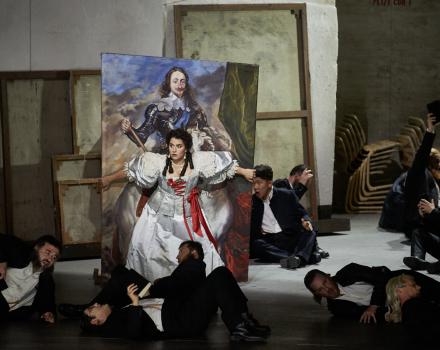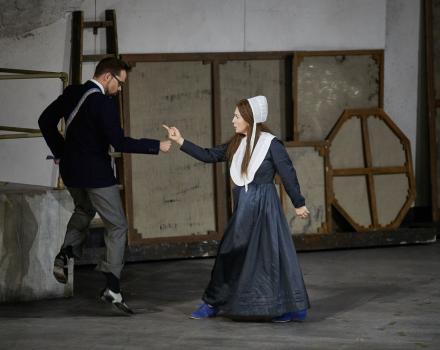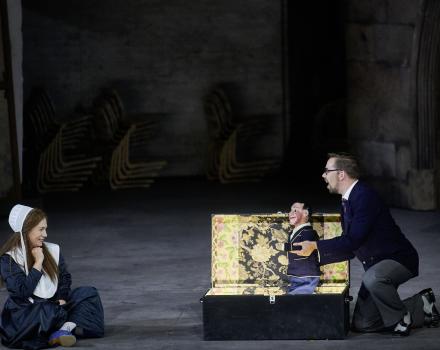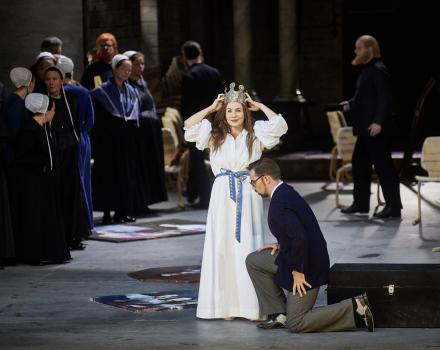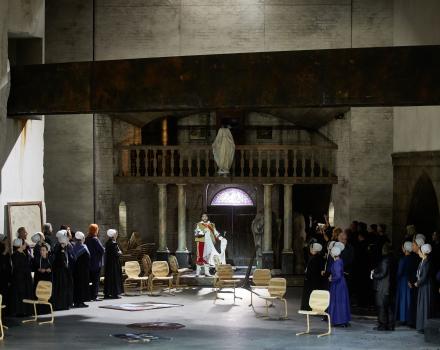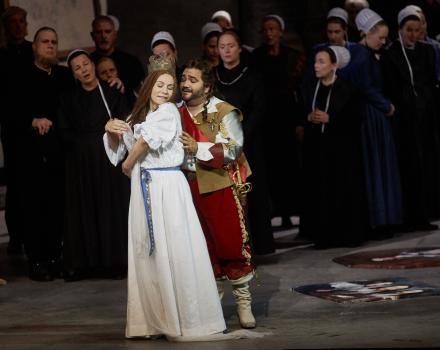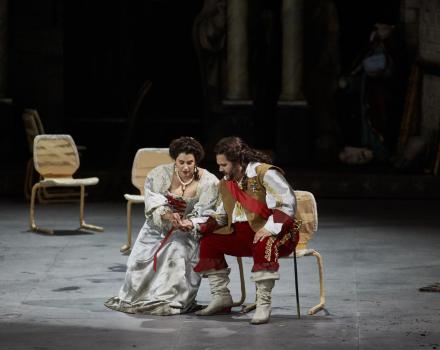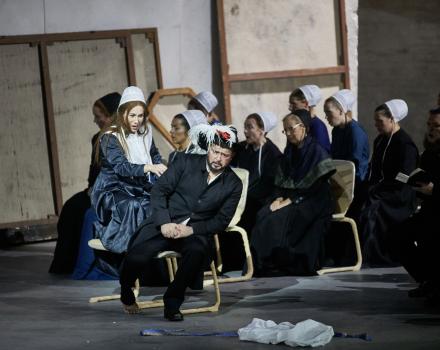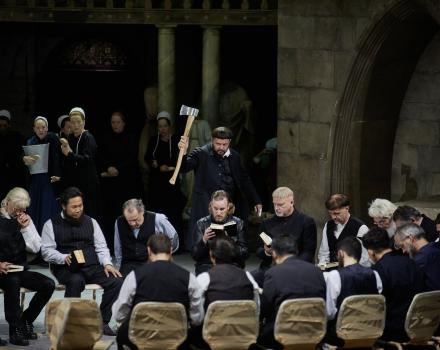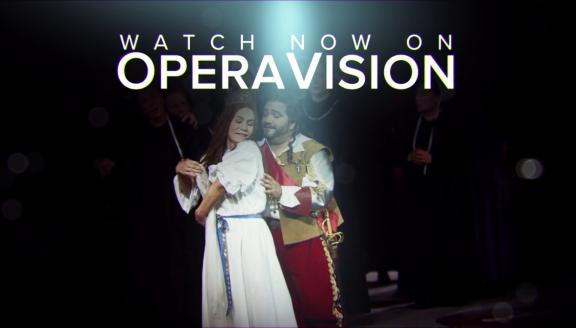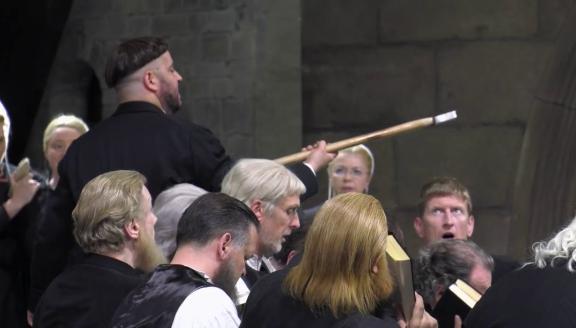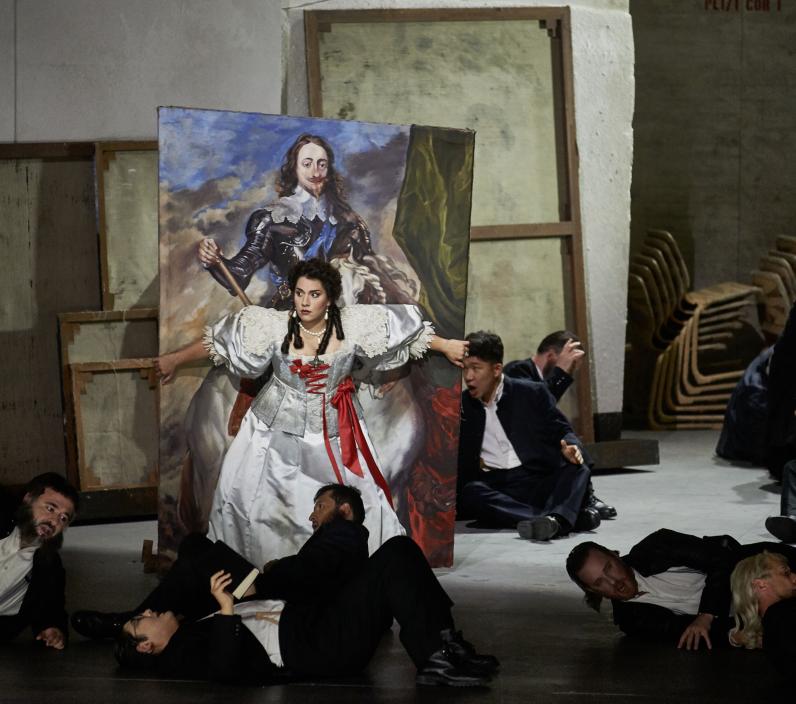

I puritani

A passionate young couple finds itself caught up in a conflict between opposing political factions. Entangled as they are in a web of political intrigue, deception and madness, will the power of their love prevail?
Set in England during the Civil War, Bellini’s last opera I puritani opposes Royalist cavaliers and rebellious Puritans. Its sweeping historical drama and romantic intrigues drew rapturous music of melancholy intensity from the composer. For the first time, this production includes the entire score written for the work’s Paris premiere.
Cast
Lord Gualtiero Valton | Roland Bracht |
|---|---|
Elvira | Ana Durlovski |
Lord Arturo Talbo | René Barbera |
Enrichetta di Francia | Diana Haller |
Sir Riccardo Forth | Gezim Myshketa |
Sir Bruno Roberton | Heinz Göhrig |
Chorus | Staatsopernchor Stuttgart |
Orchestra | Staatsorchester Stuttgart
|
| ... | |
Music | Vincenzo Bellini |
|---|---|
Conductor | Manlio Benzi |
Text | Carlo Pepoli |
Chorus Master | Christoph Heil |
Stage Directors & Dramaturgs | Jossi Wieler, Sergio Morabito |
Set & Costume Designer | Anna Viebrock |
Lighting | Reinhard Traub |
Video Director | Marcus Richardt |
| ... | |
Video
The story
C. 1650; England is in the midst of a civil war between the royalist Cavaliers and the Puritan Roundheads. King Charles I has been beheaded and the Stuart royal family has fled to France.
Act I
Elvira yearns to no longer be trapped within the walls of the Puritan fortress commanded by her father Lord Valton, which is besieged by forces loyal to the king. Even so, she cannot escape her fate, which is to be married to the Puritan Riccardo against her will. The wedding preparations are in full swing.
Only the bridegroom Riccardo has learned that Elvira’s father has withdrawn his earlier promise of his daughter’s hand in marriage, instead giving his assent to Elvira’s love match with the cavalier Arturo. Riccardo loses all self-control.
Fleeing from her forced marriage, Elvira encounters her ‘second father’, her uncle Giorgio. Giorgio comforts her and tells her how he managed to win her father Lord Valton round. Elvira’s incredulous jubilation is intermingled with festive shouts of welcome signalling Arturo’s arrival at the castle.
Elvira, with Giorgio’s support, makes arrangements for a wedding to match her own desires. The astonished Puritans are caught up in the excitement of Elvira’s and Arturo’s love.
Elvira’s father Lord Valton, however, will not be present at the wedding, as he must present a female prisoner before Parliament in London, who is suspected of being a Stuart spy. He hands a safe-conduct to Arturo which will allow him and his bride to leave the fortress.
In an unguarded moment, Arturo offers the prisoner his help. She reveals herself to him as Enrichetta, widow of Charles I. Arturo, whose father was killed fighting for the Stuarts, resolves instantly to save her from the impending execution. The possibility of escape emerges when Enrichetta is asked by Elvira to try on her bridal veil. In this disguise, she will be assumed to be Arturo’s bride and will be allowed to pass through the gates undisturbed.
At this point, Riccardo stands in their way. Once he realises that it is not Elvira, however, but the prisoner of the state hidden beneath the veil, he allows them to escape.
When Elvira sees Arturo escaping the castle alongside a different bride, her dream world collapses around her. All that remains for her is the descent into madness.
Act II
The Puritans have been cut off from the outside world by their besiegers. After their seduction by the hated Arturo they wash themselves and their castle. Giorgio tells of the crazed Elvira’s delirium.
Riccardo declares himself to be Oliver Cromwell’s deputy and his rival Arturo to be an outlaw. Elvira appears. She is desperate, through her identification with Enrichetta, to cling on to her hopes of liberation. Giorgio confronts Riccardo with his complicity in Arturo’s escape with the state prisoner. He calls on Riccardo to abandon his thoughts of private revenge since Arturo’s death would also mean death for Elvira. After long resistance, Riccardo consents. Only if Arturo confronts the Puritans in open combat will Riccardo be entitled to kill him in accordance with martial law.
Act III
Arturo has accompanied Enrichetta on her flight to France. In mortal danger, he returns home after three months. He has lost his eyesight on the field of battle. He finds Elvira when he hears her singing their own love song. Arturo asks her for forgiveness for saving the queen and professes his love for her.
Arturo’s pursuers appear. Elvira prevents Arturo from escaping and hands him over to the Puritans. The death sentence is to be carried out. Only now does he realise the extent of his guilt.
The tables are turned once more with the news that Cromwell has emerged victorious and that all his enemies are to be reprieved.
Insights
Elvira’s dream factory
Unleashing Bellini’s musical creative power
In I puritani Bellini reinvented himself. There were two key factors behind this. Firstly, for the first time since his breakthrough with Il pirata (1827) Bellini had to manage without Felice Romani, with whom he had composed seven of his nine operas to this date. Bellini’s word-focused compositional approach had consistently taken inspiration from the elegance of Romani’s verse, who had provided him with well-thought-out and well-structured libretti through his adaptations of French and Italian dramas and novels.
After a row with Romani over who was to blame for the fiasco of Beatrice di Tenda (1833), Bellini decided to write his new opera for Paris’s Théâtre-Italien in collaboration with Carlo Pepoli, an exiled Italian poet living in Paris. Pepoli had no experience of the theatre whatsoever and so was not an equal partner. Romani’s dramatic calculation and rational control over the creative process were absent. This helped to create an unbridled, even ecstatic unleashing of Bellini’s musical creative power, that took on a life of its own and time after time seems to transcend the logic of the stage.
Secondly, the blurring of the melodic and harmonic boundaries in Bellini’s composition further heightened the ‘oceanic feeling’. In this, the only one of his operas not written for Italy, Bellini broadened his creative perspective to tap into the post-Classical orchestral culture that had taken on considerable significance in France even within the operatic tradition. It is the instrumental fabric that creates a motivic and melodic relationship between the individual numbers. The differentiation and expansion of the soundscape by means of the spatial arrangement of solo voices, choral and instrumental groups beyond the stage area serves to create almost impressionistic effects.
Transcending the puritan world
We can see also that the orchestra is involved in Bellini’s compositional strategy, which is more concerned with the ecstatic heightening and enchantment of events on stage than with authenticating those events from a dramatic point of view. Bellini’s success in transcending the world of the Puritans, characterised as it was by its bans on music, dance and theatre, through the sheer intoxicating beauty of his music, is surely the most disarming gift ever bestowed upon those iconoclasts. As a result, this opera, in which Bellini seems to approach the aesthetic of reality-saturated historical dramas most closely, is, in fact, the only truly fantastical, even fabulous opera he ever wrote.
For the sake of this very paradox, our production must find a way of putting the historical imagery of the English Civil War to creative use, if there is to be a way of communicating its fantastical defamiliarisation coherently on stage. The music achieves a monumental coup of the imagination in repeatedly managing to reinterpret events on stage on its own terms, bending them to its own will. It is tempting to say that the score subjects the narrative of the libretto to its own dreamlike vision, in its search for hallucinatory wish-fulfilment. The ‘madness’ of Elvira, her schizophrenia, is not merely a critical element of the plot. The flight from an unbearable reality into fantasy is not so much an externally narrated plot element as a device used to justify the narrative form while taking place before the audience’s very eyes. The dramatic composition of I puritani shows us Elvira’s dream factory at work.
No sooner have the Puritan religious warriors announced their intention to ‘turn the camp of the Stuarts to ashes’ than the drawbridge of the still besieged castle is lowered to offer a warm welcome to, of all people, a hated enemy soldier; all this in the very middle of the bitter civil war that stretches across all three of the opera’s acts. The librettist does not even feel the need to provide Arturo with the fake identity traditional in such contexts.
Doublings and dreamlike thinking
A ‘second bridegroom’, in the shape of Arturo, is now suddenly at hand—and this time he is the desired groom. Shortly afterwards Elvira’s father hands Arturo a safe-conduct that will allow the couple to leave the fortress. In the same breath Elvira’s ‘first father’ explains why he will not be attending the wedding, at which Giorgio is to take his place as ‘second father’: he must present a female political prisoner at Parliament in London, which amounts to a death sentence. Elvira’s dream crashes down around her, this prisoner, draped as ‘second bride’ in Elvira’s extravagantly wafting veil now swoops off into the freedom she has so longed for.
So it is that on a psychological level all the inconsistencies that initially seem to disqualify the opera’s narrative prove to be remarkably coherent. The ‘dreamlike thinking’, to use Freud’s terminology, of this opera rests in Elvira’s identification with the prisoner on the basis of the common existential threat represented by her father’s authority: the underlying desire is to escape his power.
Drawn from an extended article by Sergio Morabito that first appeared in the programme book in July 2016.
Gallery
